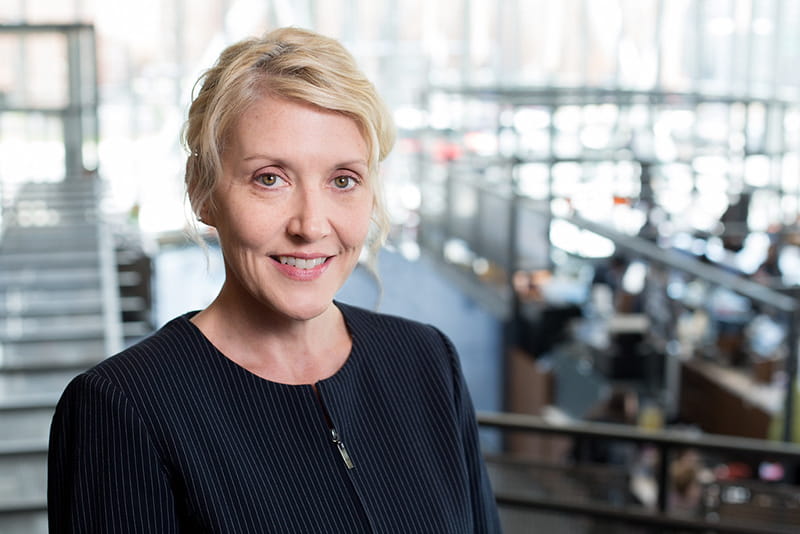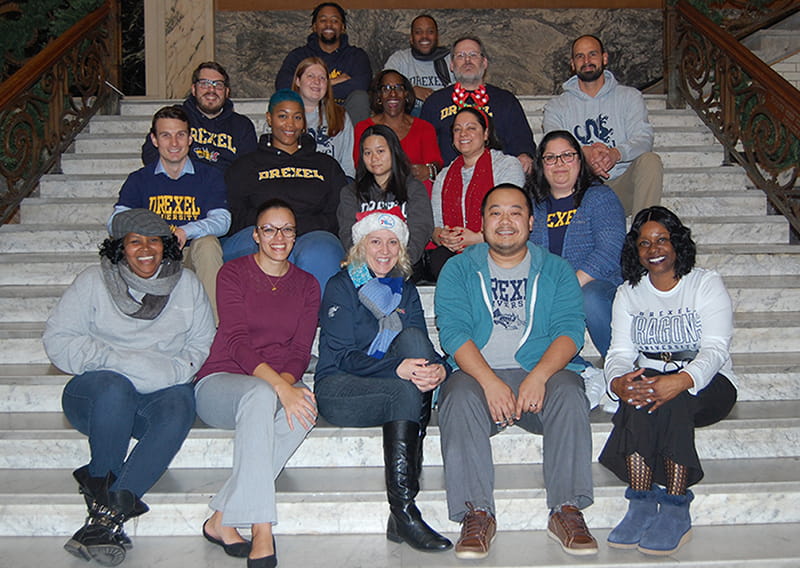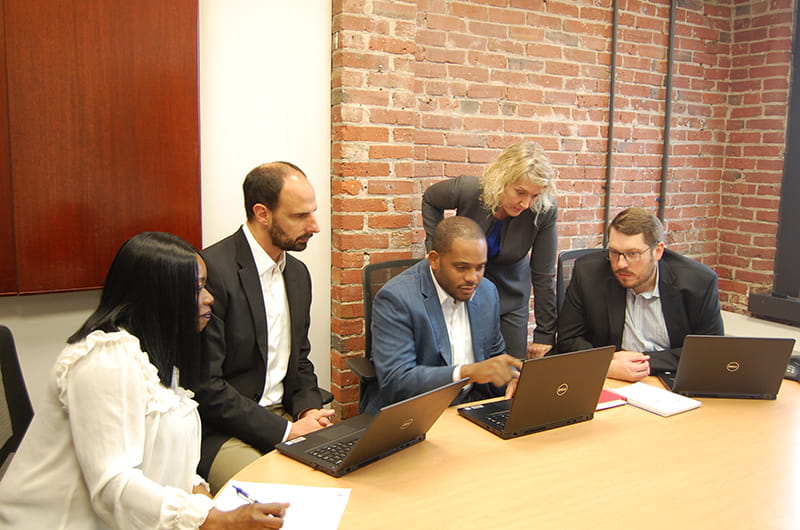Q&A: Julie Jones, Assistant Vice President of Procurement Services

Even if you don’t directly interact with Drexel University’s Procurement Services, your experience at Drexel has very likely involved the office. Procurement Services is responsible for everything from Procurement Card (P-Card) services and vendor sourcing to purchase requisitions, reimbursements and other purchasing services for Drexel University, the Academy of Natural Sciences and Drexel University Online.
Assistant Vice President of Procurement Services Julie Jones joined Drexel in the beginning of 2018. Since then, she’s built up the Procurement Services team and is working to build upon and transform Drexel’s procurement practices into more inclusive and articulated policies and priorities that are shared with the community.
Jones talked to DrexelNow in December about the current status of Procurement Services and what she has planned for her team going forward.
Q: Tell me a little bit about yourself. What were you doing before you came to Drexel and what made you want to come to the University?
A: Before Drexel, I was at La Salle University for four years. Before that, I was with the Philadelphia Housing Authority for seven years in their IT area, where I supported all of their supply chain and financial systems in a very functional way. My education and background are in computer science and information systems. When I went to La Salle, it was a natural flow for me to take on procurement. I had accounts payable, I had payroll and I had accounting at one point — so I had a crash course in a lot of different areas within higher education, which I'm really grateful for. That experience helped put a lot of things into perspective, and I found higher ed to be such an interesting industry. My background and open mind have made it really easy for me to adapt to Drexel, its culture and processes.
Q: What was it like when you first started here?
A: I think Procurement had certain things to work out: issues with customer service, changes in both procurement and higher education as an industry and our Smart Source e-procurement system that handles purchasing and accounts payable. We were also dealing with a lack of human resources due to several open positions.

When I came in at the end of January 2018, we had three major areas: P-Card, sourcing (which encompasses purchasing and contract management), and an area formerly called business support, which handled Smart Source and helping suppliers register in the system. There were structural and organizational changes that needed to be made.
Over the past year, I’ve been able to build up the team — within budget — from 10 people to a fully staffed group of 17. Of those 17, only four have been here longer than a year. Of the 11 new hires, none of them came from higher education. That wasn't by design; it just was the application pool that came in and the skill set that they brought. But I think it turned out to be a bit of a gift, because both procurement and higher education have changed drastically over the last few years. I'm grateful to have fresh eyes as we are trying to be unique and build something very different.
Q: What kind of restructuring was done with this new staff?
A: We hired a director of strategic sourcing this summer, Dave Collins, who is a contract lawyer, so that background makes him really valuable to help us navigate our contracts and our negotiations. Dave’s team has four strategic sourcing specialists, three of whom are new to Drexel within the last eight months.
I just consolidated our travel and P-Card area, and that's now under the leadership of our assistant director of P-card and travel, Una Massenburg. Una’s team consists of two individuals primarily dedicated to P-Cards, and two travel and P-Card analysts.
The procurement support team is led by our director of procurement support, Michele Arias. Three individuals handle all of our supplier onboarding, system modifications and implementation, and any issues we might have in the Smart Source system. Another team member is responsible for facilitating any procurement audits, whether they be internal or external, and performing audits within our team. Each team has identified their primary functions in the form of a checklist, which we use to audit our own work. We're hoping to identify gaps in processes and make sure that we routinely follow our documented processes and policies. We're also looking to make sure our workload is distributed evenly, so we can adjust as needed.
In addition to these three major groups, we’ve hired two other positions that will really help Drexel become a leader in higher education procurement. Having a dedicated director of supplier diversity is really important and not that common for a university of Drexel’s size, so we are fortunate to have Allen Riddick on board. He handles not just supplier diversity, but also our initial interactions with local small businesses, as well as the sustainability component of procurement. I expect the director to work closely with small and diverse businesses to help them thrive, whether by doing business directly with Drexel or by facilitating their growth working with other organizations.

Finally, we added a dedicated procurement analyst — Joshua Hurdle — which is a critical position because procurement is no longer considered just an administrative area. It's really a strategic area that can provide an enormous benefit to both the University as a whole and also to individual units, including those with smaller budgets, by using data to negotiate with suppliers for pricing that is sensitive to different sized budgets.
Q: So that was your first year. What do you have planned for the future?
A: With our new staff and structure completed, fiscal year 2019 is the housekeeping year, when we’re getting everybody onboarded, looking at the e-procurement system, reviewing our policies and our processes and also refreshing our website and how we present ourselves to the community.
We are in the middle of reviewing all the feedback for our draft revisions of the P-Card Policy. The goal in revising that policy is to better align it with the University’s strategic priorities and best practices. Hopefully we'll get it approved in January and then roll it out in February. Once the revised P-Card Policy is rolled out, we will take a similar fresh look at our other procurement policies, including the travel policies, before the end of the fiscal year.
We are also examining our Smart Source system and our data. We will start making some system improvements to make Smart Source more user-friendly, for example, by launching a new functionality called Dashboards, which will give our viewers an instant snapshot of where their requisitions are and items they need to address right away.
From a communications standpoint, we’re working on launching a quarterly newsletter and eventually seek to produce an annual report that will share stats and information about procurement for the fiscal year with the community. I want the University community to have an expectation that we will be open, transparent and informative. The newsletter will highlight accomplishments, new contract partnerships, system changes, updates and trainings. We’re also streamlining our website so it will be easier for folks to find information they need.
Along those same lines of strengthening outreach, we are going to initiate a procurement advisory group composed of 10-12 participants — rotating annually — from all walks of the University. This group will change each fiscal year and participate in four quarterly meetings, which will focus on an agenda they set for that particular year. Right now, we're planning to kick off our first group for FY20.
Finally, we are seeking more opportunities for engagement with academic programs at Drexel to which we can contribute knowledge and expertise. For example, our sourcing team just participated in a graduate student project in the supply chain program at the LeBow College of Business.

Q: What would you want people who don't regularly use Procurement Services to know about your office?
A: I would say that we're a department that works directly with a lot of our community members. Whether they have a P-Card, whether they have to submit a reimbursement for travel or meals or whether they are just concerned with making the most prudent use of their department’s budget — anything that's purchased for the University flows through here. But we aren't just an administrative function; we truly do want to be strategically partnered with our colleagues. We care about their individual budgets, and we do the very best we can to help them maximize every dollar spent.
Generally speaking, I want people to know our team is very committed to Drexel and its mission, as well as to the work we do in Procurement to support our customers — the University community. We have a great deal of respect for Drexel’s academic mission, because at the end of the day, our students come here to learn. They also come here to see Philadelphia, to be at Drexel and to enjoy the amenities that we have — and Procurement supports every part of that, while also ensuring the responsible stewardship of our students’ tuition dollars.
Q: Is there anything else that you want to bring up?
A: I say this not in a corny way, but I have admired Drexel for years, even before I went into higher education. I was always drawn to this University, with its location and academic structure with the co-op. I always thought it was a great learning environment, and I consider myself a forever student and teacher. I am more than grateful to be here at Drexel, and I find the members of my team either buy in to drinking my Kool-Aid or they truly feel the same way I do. I think I'd just want the community to know that we are genuinely happy to be here and are looking forward to working with them.
This story was published in the winter 2019 issue of Drexel Quarterly.In This Article
Drexel News is produced by
University Marketing and Communications.

